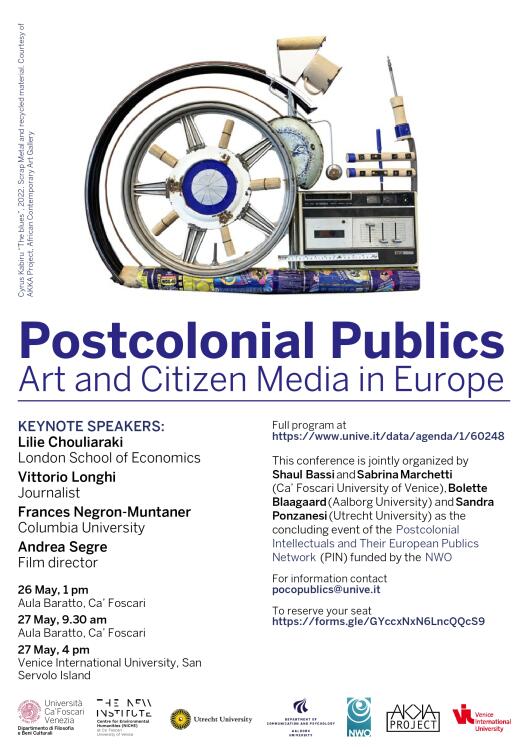
Research network
PIN - Postcolonial Intellectuals and their European Publics
PIN, the Postcolonial Intellectuals and their European Publics Network, is a NWO-funded project that brings together more than 25 European academics from nine universities. PIN not only focuses on postcolonial intellectuals as critical individuals in the public eye but also challenges the traditional definition of the ’public intellectual‘ by emphasizing the role of artists, writers, activists and social movements in shaping postcolonial publics and knowledges. The interdisciplinary network investigates the role of postcolonial public intellectuals as crucial agents in renewing the function of the humanities and of democratic participation in Europe and beyond.
The conference “Postcolonial Intellectuals and their European Publics” (University of Utrecht) successfully kicked-off the PIN network in February 2019. As the second event in this conference series, the PTTS team co-organised “Intellectuals Across Borders: Writers, Artists, Activists” (IAB2019), hosted by the University of Münster and the University of Lisbon (5-6 September 2019). The conference worked with the idea that writers, artists, and activists – like migrant academics and political representatives – can embrace the role of postcolonial intellectual through intervention and public impact. IAB2019 therefore asked how postcolonial intellectual interventions across boundaries challenge the divides between public and private, inclusion and exclusion, citizen and migrant, and create counter-publics where sexual, ethnic, religious, and other minoritized groups stake their claims and play out their actions. The conference brought into focus the manifold, productive, and often unexpected ways in which public intellectuals engage in European societies. For more information on the conference, please visit here.
In 2020, the Postcolonial Bauman: 10th Anniversary Conference was organised jointly by PIN and The Bauman Institute of the University of Leeds. This transdisciplinary conference proceeded in this spirit by inviting a dialogue between Bauman and postcolonial studies organised around four overlapping strands, each of which reflects on the composite figure of ‘postcolonial Bauman’: postcolonialism and postcommunism, postcolonial Europe, the intellectual as outsider and the intellectual as seen from the outside. Keynote speakers included Etienne Balibar, Carlo Bordoni and David Lyon. More information on the conference can be found here.
In 2022, the conference will be held in Ca' Foscari University of Venice, which will also serve as the concluding event of the PIN network. The conference “Postcolonial Publics: Art and Citizen Media in Europe” deals with the topic of postcolonial publics expressed and engaged through “citizen media” and art in a postcolonial Europe. Keynotes addresses and sessions will serve to interrogate the proliferation of digital media and global culture, and the changes happening in public intellectual engagements. Speakers include Andrea Segre, Frances Negron-Muntaner, Lillie Chouliaraki and Vittorio Longhi. Further information on the conference can be found here.
PIN members include:
Sandra Ponzanesi (Utrecht University), Ana Cristina Mendes (University of Lisbon), Mark U Stein, Julian Wacker, and Felipe Espinoza Garrido (all Uni Münster), John McLeod, Graham Huggan, and Max Silverman (all University of Leeds), Adriano José Habed (University of Verona), Daniela Merolla (Sorbonne Paris Cité, USPC), Paulo de Medeiros (University of Warwick), Sabrina Marchetti and Shaul Bassi (University of Venice, Ca’ Foscari), Bolette B. Blaagaard (Aalborg University), and Neelam Srivastava (University of Newcastle).

